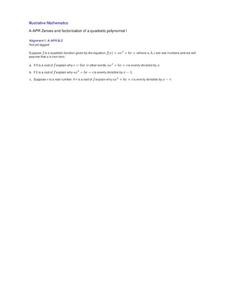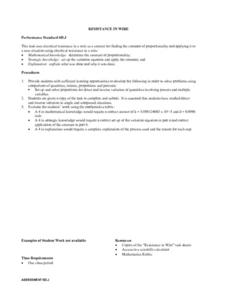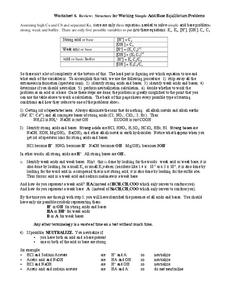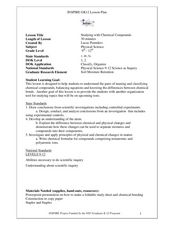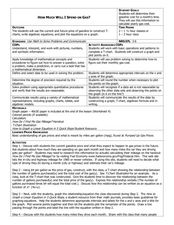Illinois State Board of Education
Is It Linear?
Math apprentices are introduced to the components of a linear relationship. In groups, they write story problems that incorporate this relationship and relates to the real world. They give their problem to the class for them to solve.
Curated OER
The Pythagorean Theorem Lesson 2
Learners discuss and review examples of the Pythagorean Theorem using a GSP, Geometer's Sketchpad, activity.
Illustrative Mathematics
Zeroes and factorization of a quadratic polynomial I
This activity uses the division algorithm and the definition of a zero/root of a function to guide your class to see the relationship between zeros and factors of a general quadratic, which can later be generalized to the Remainder...
Curated OER
Resistance in a Wire
Students find the constant of proportionality and apply it to a situation. They use the electrical resistance in a wire as a context for finding the constant of proportionality. In addition, they write an explanation and justification of...
Curated OER
WINDMILL POWER
Learners study operations with real numbers using mental computation or paper-and-pencil calculations. They judge the reasonableness of numerical computations and their results. They set up and solve proportions for direct and inverse...
Curated OER
Walking Home II
Young scholars explore the relationship between distance and time. They analyze a situation involving distance traveled in a given period of time, represent the situation graphically and algebraically, and discuss the concept of slope as...
Curated OER
Acid/Base Equilibrium Problems
In this acid and base equilibrium instructional activity, students calculate the pH of given acid and base problems using different starting materials. They are given information and hints as to how to work with acid/base equilibrium...
Curated OER
Acid/Base Equilibrium Problems
In this acid and base equilibrium worksheet, students calculate the pH of various types of acids and bases. They are given directions and review information as to how to complete these problems.
Curated OER
Modeling Natural Disaster with Mathematical Functions
Ninth graders investigate the functional relationship of different environmental phenomena. In this math lesson, 9th graders create models of various natural disasters. They use logarithmic and exponential functions to interpret...
Curated OER
Automobile-Accident Reconstruction
Students investigate an accident and relate it to math. In this trigonometry lesson, students measure the accident scene, the friction produced, and the speed from the skid marks. They create a poster of their findings.
Curated OER
Buying on Credit
Students determine how buying on credit adds to the total cost of an item by computing the interest. They find a major item advertised in a magazine and identify the price. Then they identify the rate of a credit card and calculate the...
Curated OER
Living Room Redecoration
Fourth graders use math in a living room redecoration lesson plan. In this geometry lesson plan, 4th graders get the dimensions of a living room and need to find the amount and cost of paint and flooring. They read different scenarios...
Curated OER
Photosynthesis and Respiration
Eighth graders differentiate photosynthesis and respiration. In this biology instructional activity, 8th graders draw a diagram explaining these two processes. They answer a quiz after the instructional activity.
Curated OER
Ballistic Pendulum Lab
Students determine the muzzle velocity of projectile launcher. In this physics lesson, students compare the pendulum method and kinematic method in calculating the initial velocity. They analyze data and discuss results in class.
Curated OER
Chemical Bonding
Eighth graders identify the three main types of chemical bonds. In this chemistry instructional activity, 8th graders draw Lewis dot diagrams of elements and determine the bond formed. They create a model water molecule.
Curated OER
Physical and Chemical Changes
Eighth graders distinguish between physical and chemical change. For this chemistry lesson, 8th graders observe a series of demonstrations showing physical and chemical changes. They identify the signs that a chemical reaction took place.
Curated OER
Cycles Review
Eighth graders discuss the four major cycles of matter. For this general science lesson, 8th graders decide which of the four is the most important. They share their opinion in class.
Curated OER
Grating Spectrometer
Students calculate the Balmer series. In this physics lesson, students observe hydrogen lamp spectra using spectrometers. They calculate wavelength and compare them with their theoretical calculations.
Curated OER
Studying with Chemical Compounds
Students create a foldable to help them remember topics on chemical compounds. In this physical science lesson plan, students differentiate ionic and covalent compounds. Given certain compounds, they identify whether it's ionic or covalent.
Curated OER
WORKING WITH WORKBOOKS
Students work through problems in the textbook and teacher-made problems to reinforce the new learning. They turn in practice problems to instructor to be checked for accuracy and evidence of understanding
Pennsylvania Department of Education
Using Multiplication to Solve Word Problems
Fourth graders solve word problems using multiplication. In this multiplication lesson, 4th graders write and solve word problems using their prior knowledge of multiplication.
Curated OER
Graphing Inequalities and Shading
Students graph and shade inequalities. In this algebra lesson, students graph inequalities using the slope-intercept form. They shade the side of the line that is the solution and identify the domain and range.
Curated OER
How Much Will I Spend On Gas?
Students construct a linear graph. In this graphing lesson, students determine a monthly budget for gasoline. Students construct a t-chart and coordinate graph to display data. Resources are provided.
Curated OER
Living Room Redecoration
The student calculate area and perimeter based on the dimensions of a living room. They determine the amount of supplies needed for painting and carpeting the room. Students create a portfolio of their information.




